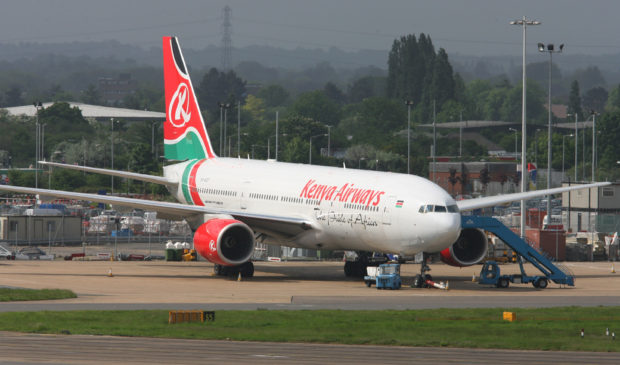The Boeing Co. 737 Max crash in Ethiopia looks increasingly likely to hit the planemaker’s order book as mounting safety concerns prompt airlines to reconsider purchases worth about $55 billion.
VietJet Aviation JSC, which doubled its order to 200 of the aircraft priced at about $25 billion only last month, said it will decide on its future plans once the cause of the tragedy has been found, while Kenya Airways Plc is reviewing proposals to buy the Max and could switch to Airbus SE’s rival A320.
That’s as Indonesia’s Lion Air firms up moves to drop a $22 billion order for the 737 in favor of the Airbus jet, according to a person with knowledge of the plan, while a $5.9 billion Flyadeal order hangs in the balance. Boeing, whose shares have lost 12 percent of their value this week, faces escalating financial risk after two disasters involving its newest narrow-body jet in the past five months.
The stock was up less than 1 percent at $378 in early U.S. trading on Wednesday.
Earlier Crash
A Lion Air Max plane crashed on Oct. 29, souring relations with Boeing after the manufacturer pointed to maintenance issues and human error as the underlying cause, even though the flights’s pilots had been battling a computerized system that took control following a sensor malfunction.
Sunday’s loss of an Ethiopian Airlines 737, in which 157 people died, bore similarities to the Asian tragedy, stoking concern that a feature meant to make the upgraded Max safer than earlier planes has actually made it harder to fly.
The 737, which first entered service in the late 1960s, is the aviation industry’s best-selling model and Boeing’s top earner. The re-engined Max version has racked up more than 5,000 orders worth in excess of $600 billion.
Boeing is in crisis as airlines around the world ground the plane, with regulators from Australia to Europe denying it access to their airspace. In a dramatic development, the European Aviation Safety Agency has split with the Federal Aviation Administration in banning the Max, leaving the U.S. regulator isolated in insisting that it’s still safe to fly.
VietJet is monitoring the situation and will reach a decision on whether to go ahead with its purchase following “official conclusions” from global regulators and the Civil Aviation Authority of Vietnam, it said in a statement Wednesday.
Flyadeal
Flyadeal said in December it would switch from Airbus and purchase up to 50 737 Max jets, subject to final terms being reached. The carrier, a unit of Saudi Arabian Airlines, said it’s waiting on the results of the investigation. “We’re closely monitoring the situation and are in constant contact with Boeing,” the company, said in an email. “There are no conclusions to be drawn at this time.”
Lion Air was already looking at scrapping its Boeing deal after October’s crash, which killed 189, and the African disaster has made co-founder Rusdi Kirana more determined to cancel the contract, according to the person familiar with the situation, who asked not to be named as the plans are private.
Kenya Airways will consider switching to Airbus or could opt to take more of the older 737-800 version of the Boeing jet, which doesn’t feature the suspect system, Chairman Michael Joseph said in an email, without ruling out sticking with the Max. The company revived plans to expand its network last year with a proposal to buy as many as 10 of the planes worth about $1.2 billion.
Some 32 of those killed in the Ethiopian crash, which happened six minutes after the plane took off from Addis Ababa for Nairobi, were Kenyan citizens, the most for any single country.
“We will carefully follow the developments around the 737 Max,” Joseph said. “No decision has been taken yet.” Sub-Saharan Africa’s third largest carrier is almost 50 percent state-owned after a reorganization in 2017, with long-time investor Air France-KLM Group shrinking its holding to less than 10 percent.
Kenya Airways has about 40 aircraft including eight 787 wide-bodies and the same number of 737-800s. The Dreamliner fleet will likely expand to add long-haul services, Joseph said, requiring more smaller planes to feed them with customers. Those might include turboprops and Airbus A220 or Embraer SA E2 regional jets, as well as 737-sized models.





















 New Texas Law Requires Insurers Provide Reason for Declining or Canceling Policies
New Texas Law Requires Insurers Provide Reason for Declining or Canceling Policies  10 Do’s and Don’ts of a Smart ORSA Report
10 Do’s and Don’ts of a Smart ORSA Report  High Court Ruling on Trump Tariffs to ‘Ease Uncertainty,’ Says AM Best
High Court Ruling on Trump Tariffs to ‘Ease Uncertainty,’ Says AM Best  AI Claim Assistant Now Taking Auto Damage Claims Calls at Travelers
AI Claim Assistant Now Taking Auto Damage Claims Calls at Travelers 











